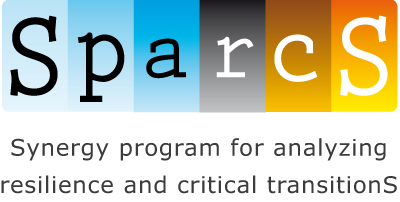Society
Stock market crashes and the meltdown of governments as during the Arab spring are striking examples of unexpected sudden change in society. On a more subtle scale, the dynamics of public attitudes to certain problems is characterized by incidental massive shifts. Obviously, understanding such dynamics is important from may perspectives, and it would be worth a lot if we could detect when societies are approaching the brink of such a turn-over.
We work with social scientists at understanding the feedbacks that may cause tipping-points in social systems. Moreover, we aim to find indicators of reduced resilience from the analysis of social media data and other available resources.
Selected references
Technology driven inequality leads to poverty and resource depletion
Mirza, M.U., Richter, A., van Nes, E.H. & Scheffer, M. (2019)
Ecological Economics 160:215-226 [full text]
Inequality in nature and society
Scheffer, M., van Bavel, B., van de Leemput, I.A. & van Nes, E.H. (2017)
Proceedings of the National Academy of Sciences 114 (50):13154-13157 [full text]
From scientific speculation to effective adaptive management: A case study of the role of social marketing in promoting novel restoration strategies for degraded dry lands
Westley, F., Holmgren, M. & Scheffer, M. (2010)
Ecology and Society 15 (3)[full text]
Resilience: Accounting for the noncomputable
Carpenter, S.R., Folke, C., Scheffer, M. & Westley, F. (2009)
Ecology and Society 14 (1)[full text]
The evolutionary basis of rigidity: locks in cells, minds, and society
Scheffer, M. & Westley, F.R. (2007)
Ecology and Society 12 (2):36 [full text]
Slow response of societies to new problems: Causes and costs
Scheffer, M., Westley, F. & Brock, W. (2003)
Ecosystems 6 (5):493-502 [full text]
Socioeconomic mechanisms preventing optimum use of ecosystem services: an interdisciplinary theoretical analysis
Scheffer, M., Brock, W. & Westley, F. (2000)
Ecosystems 3 (5):451-471 [full text]

